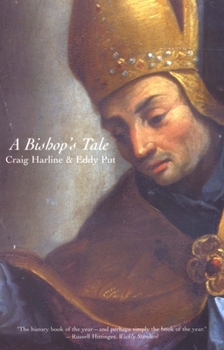A Bishop's Tale: Mathias Hovius Among His Flock in Seventeenth-Century Flanders
Select Format
Select Condition 
Book Overview
This absorbing book takes us back to the busy, colorful world of a Netherlandish Catholic bishop and his flock during the age of Reformation. It is drawn from a rare journal, one of many kept by Mathias Hovius from 1596 to 1620 while he was Archbishop of Mechelen (part of modern Belgium). Elegantly written, the book focuses not only on the life of Mathias Hovius but also on key events and characters of his time; it portrays "lived religion," so that...
Format:Paperback
Language:English
ISBN:0300094051
ISBN13:9780300094053
Release Date:April 2002
Publisher:Yale University Press
Length:384 Pages
Weight:1.10 lbs.
Dimensions:1.1" x 5.0" x 7.9"
Customer Reviews
4 ratings
Real history, real people
Published by Thriftbooks.com User , 14 years ago
Harline and Put's book takes you back to the frontlines of The Reformation through the lives of real people. Rather than a staid and macro view of this pivotal time in our history I got a lively and personal perspective. I didn't read about the epic and international struggles of Kings, Popes and Reformers. A multitude of books on those topics exist. Rather I read about how those larger than life struggles affected real people in a small corner of the real world. I sensed life unfolding before my eyes as I turned the pages of Mathias Hovius' daybook. Rather than a biography with its inevitable eye to a legacy, I got to know Mathius the man. And through this lense the people, the culture and the time in which he lived his very real life.
Captivating, a historian's dream
Published by Thriftbooks.com User , 15 years ago
The journal of Mathius Hovius is incredibly colorful and dramatic (he even describes what clothing people wore, right down to the color/jewelry). For someone seeking to learn about the renaissance in Europe, it is a MUST read.
A Portal Through Time
Published by Thriftbooks.com User , 23 years ago
As a layman who likes to study history, I enthusiastically give this book a rating of five stars. Many history books give broad descriptions and interpretations of trends and events. Others attempt to popularize or modernize history by interpreting old events from the perspective of the late 20th century. "The Bishop's Tale" does none of this. Instead, it virtually transports the reader back to Flanders in the late 1500s and early 1600s, treating him to a small but rich slice of history in a small but fascinating corner of Europe. The authors -- who were fortunate enough to have found one volume of an extensive journal kept by the Archbishop of Mechelen during this period -- provide us with a series of wonderfully detailed pictures of religious life in what was then known as the Spanish Netherlands. Each chapter forms a separate window through time that provides the reader with a close-up view of the goings-on surrounding a specific issue, event, or person. The common thread running through all sixteen chapters is the archbishop and his efforts to build a stable Catholic community in a turbulent time and place. The authors don't try to overly interpret events or force them to fit into some sort of grand theoretical framework, as do many academic historians. Instead, it seems that Craig Harline and Eddy Put want to directly expose the reader to history in a way that enables him to develop a good "feel" for what it must have been like to be Catholic and Flemish around 1600. I found myself wanting to read the book slowly, so that I could savor every page.
Not entirely satisfying
Published by Thriftbooks.com User , 23 years ago
In the reviews I've read, this book has received nothing but praise. In many ways, this is an excellent work of academic research. The authors show sensitivity and a deep understanding of the institutional framework within which archbishop Hovius could operate. Most emphasis is put on the human and local particularities controlling the relations between an archbishop and the man and women manning the diverse strata of the ecclesiastical hierarchy. The preponderance on the human side of archbishop's dealings with the people surrounding him lead to excellent small stories which are impressively placed in the wider context of the political and religious strife of early 17th century Europe. Moreover, the book is very well written. It was an easy read.Yet, despite all the book's cleverness, I grew increasingly uncomfortable while reading. Harline and Put have written a book on religious life in late 16th/early 17th century Europe. Still, I have not read much about religion. In fact, in this book, religion comes out as a very mechanical thing. We read about cardinals, nuncios, priests, rituals, processions, pilgrimages etc. But we do not get a glimpse of what it could have meant to *be* a Christian in this particular time in history. We do not read how Hovius (could have) *lived* his religion. We get no sense at all of a religious feeling which - unlike today - must have been overly present everywhere. Instead, the narrative is littered with much misplaced irony on the nature of christianity or even religion. Harline and Put consider the Catholic Church as nothing more than a big bureaucracy. Hovius, travelling around his bishopric, is portrayed as the 16/17th century version of a district area manager of Coca Cola, trying to reach his production quota for next year, and fighting to protect his market share against competitors. The book is a product of the 21st century. It might easily be used as a leadership guideline, to be read by management consultants and managers.




